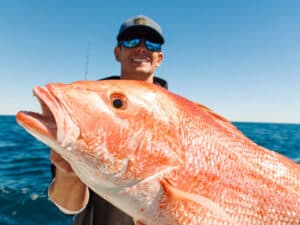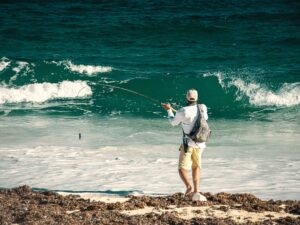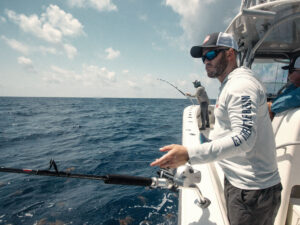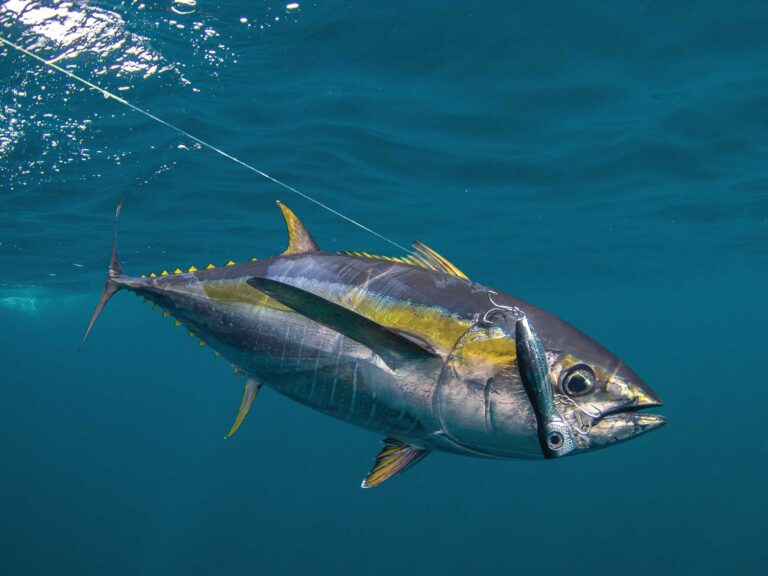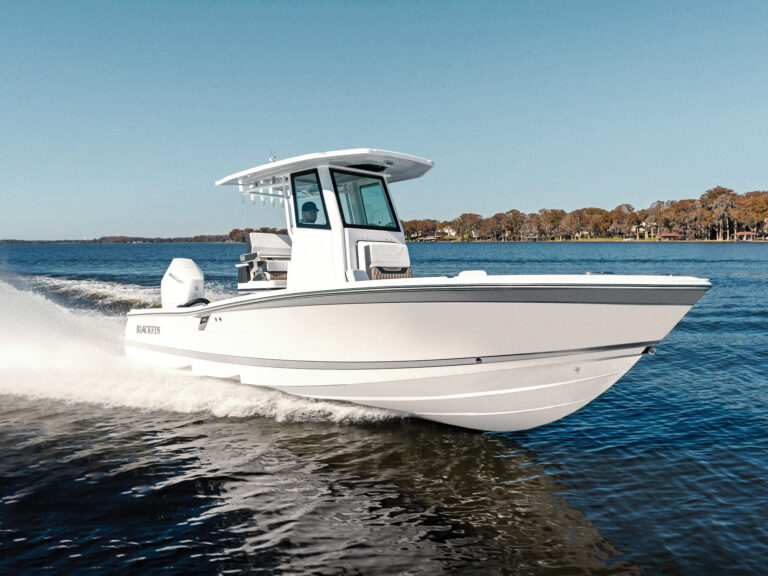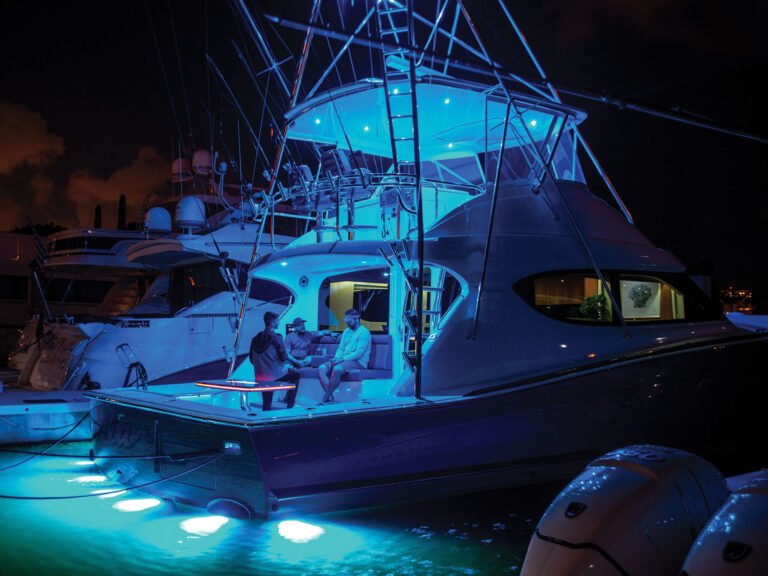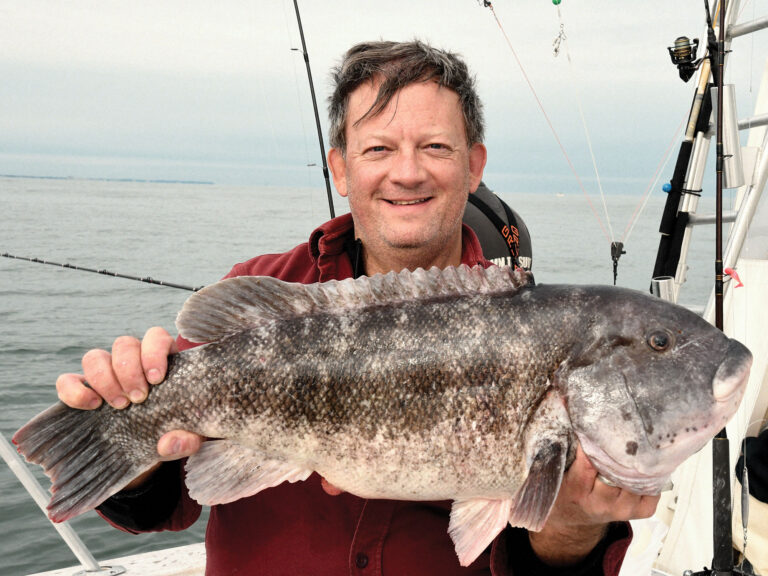This year ushers in a wealth of advancements in marine electronics to help boating anglers navigate, communicate, entertain and, of course, catch more fish. Much of the innovation focuses on integration of electronic elements, but there are also remarkable developments in new multifunction displays, ultra-sophisticated sonar transducers, and a new mobile app that lets you access satellite data that can lead to greater offshore angling success. Here are 10 examples of innovative new marine electronics available to boating anglers in 2024.
Quicklook: 10 Marine Electronics Innovations for 2024
- Simrad NSX Ultrawide
- Shakespeare Dorsal VHF Antenna
- Airmar Medium Ultra-Wide-Beam Transducers
- Furuno FCV-600 and FCV-800 Fish Finders
- JL Audio HTML Interface
- Icom IC-M510BB Black-Box VHF Radio
- SiriusXM Fish Mapping App for Mobile Devices
- Standard Horizon HX320 Submersible Handheld VHF Radio
- Raymarine-Rhodan Integration
- Garmin’s EchoMap Ultra 2 Series
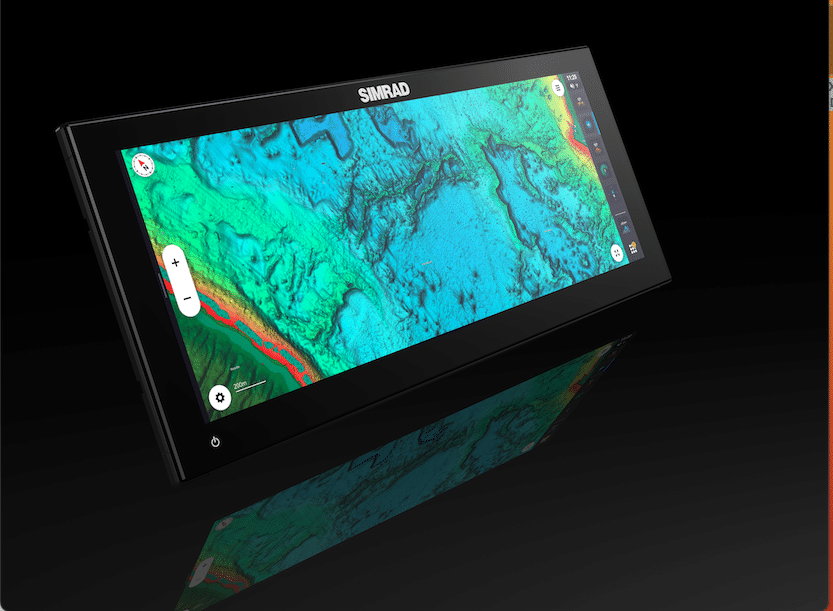
Simrad NSX Ultrawide
The spectacular new NSX Ultrawide MFDs from Simrad (pictured above) are engineered to deliver the benefits of dual screens in just one display. Available in 12- and 15-inch (diagonal) screens, the revolutionary aspect ratio provides the best view to explore the latest NSX operating system. Boating anglers can create unique split-screen views on the MFDs.
What’s more, the bundled C-Map Discover X charts for North America and Canada are optimized for the new Ultrawide display’s high-pixel density. Extra detail can be added with an upgrade to the optional Reveal X shaded-relief and satellite imagery charting. The NSX Ultrawide is packed with familiar features of the NSX, and it easily integrates with other Simrad marine electronics, including sonar technologies across a wide range of transducers. $2,749 for the 12-inch model, $3,399 for the 15-inch; simrad-yachting.com
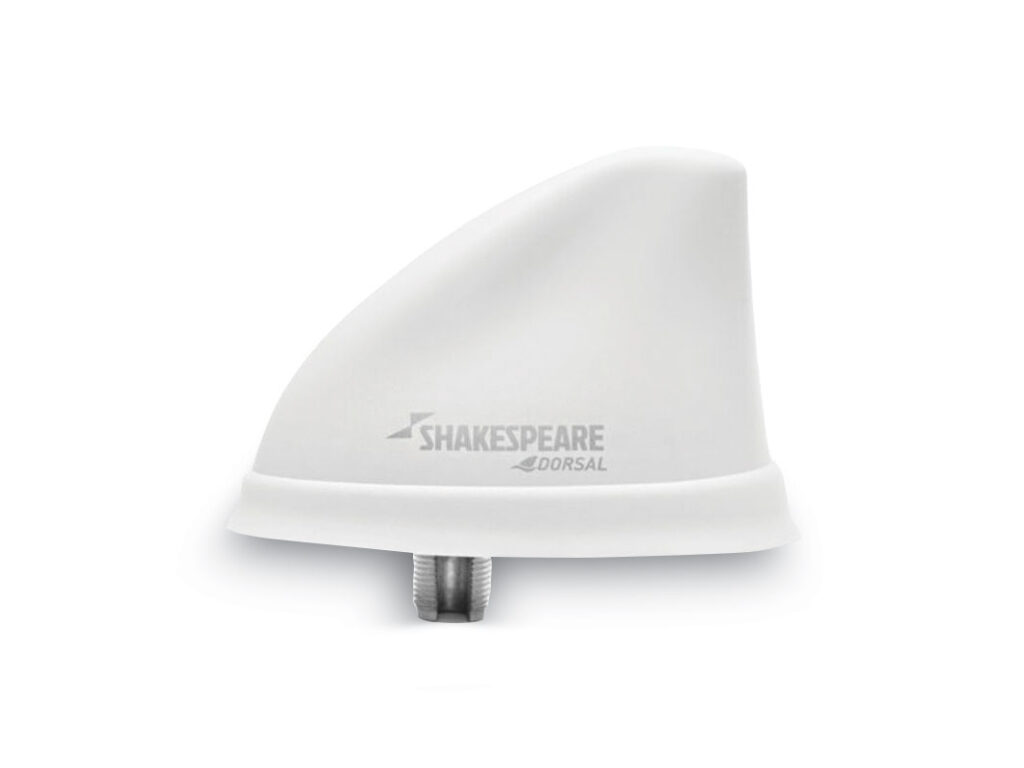
Shakespeare Dorsal VHF Antenna
The new Dorsal 5912-D-VHF antenna from Shakespeare offers a low-profile, aerodynamic, fin-shaped design. It’s perfect for boats such as flats skiffs that can’t easily accommodate a polelike antenna. Boating anglers who don’t want a conventional antenna interfering with casts will love the Dorsal. The surface-mount antenna won’t interfere with style lines, yet it is suitable for VHF ranges up to 10 miles.
The ABS body—available in white or black—measures 2.75 inches tall by 4 inches long by 2.3 inches wide and has a rubber base to seal out moisture. It includes a 26-foot coaxial cable and a PL-259 plug, and requires a 1/2-inch hole to install on a horizontal surface. $109.99; westmarine.com
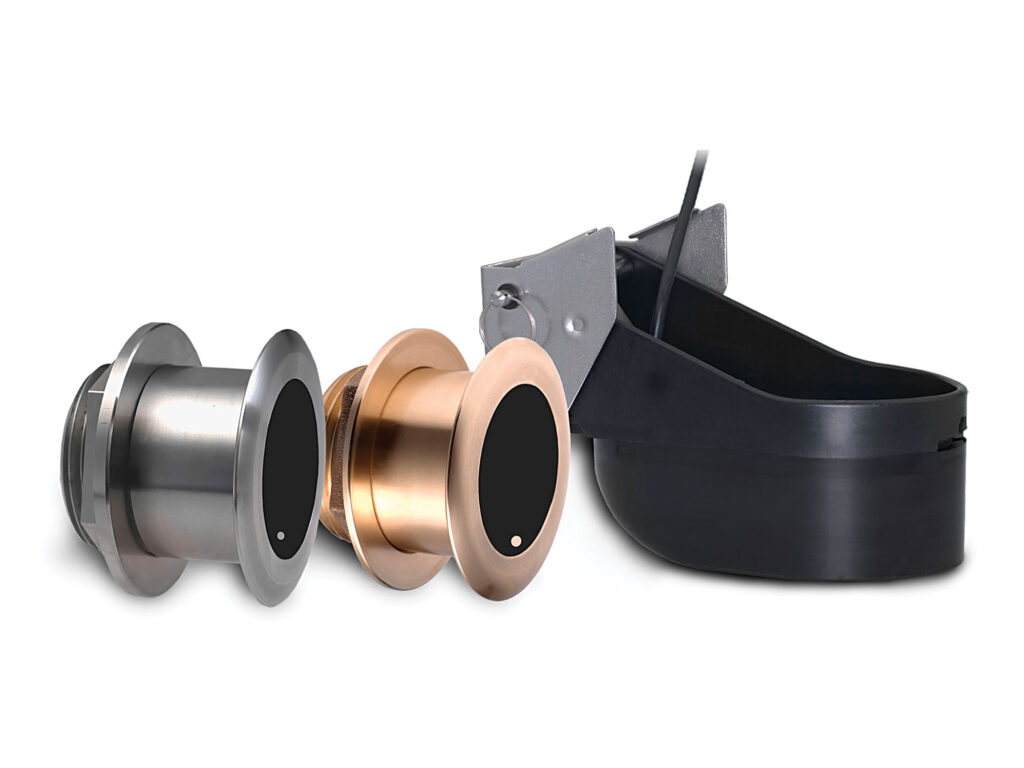
Airmar Medium Ultra-Wide-Beam Transducers
Airmar Technology Corp. has introduced a new line of three medium-frequency ultrawide transducers featuring single-frequency elements. These chirp-ready 1 kW, 60 to 100 kHz transducers feature a unique concave ceramic array design that delivers an incredible ultrawide beam width ranging from 57 to 73 degrees port and starboard, and a 16-degree average beam width fore and aft.
Ideally suited for anglers seeking species down to 1,300 feet, the new medium B175MW (bronze housing) and SS175MW (stainless-steel housing) transducers are low-profile, tilted-element models that also include fast-response water-temperature sensors.
The TM185MW ultrawide transom-mount version uses the same ceramic array in a urethane-bodied transducer with a stainless-steel transom bracket. Tilted-element models are available in zero-, 12- and 20-degree tilt angles. When the new medium ultrawide models are paired with other popular Airmar models, such as the B275LHW, anglers are equipped with a broad set of frequencies (low, medium-wide and high-wide) to find fish deep and shallow. To learn more, visit airmar.com.
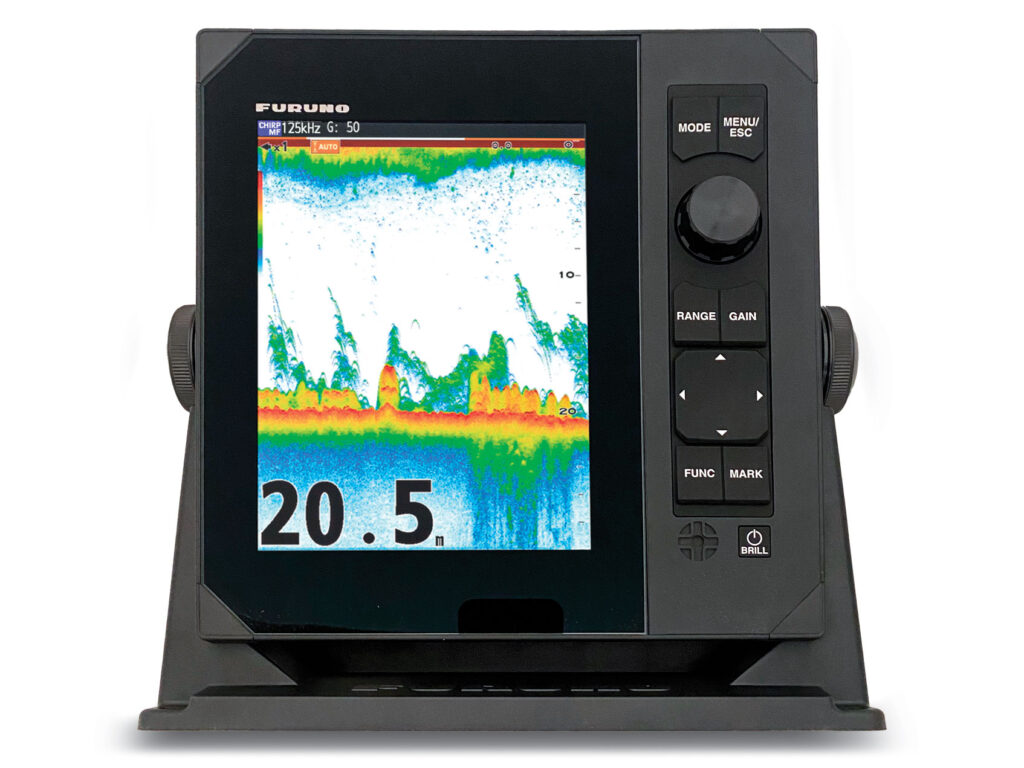
Furuno FCV-600 and FCV-800 Fish Finders
Furuno’s two newest fish finders—the 5.7-inch FCV-600 and 8.4-inch FCV-800—can drive either a chirp or a dual-frequency continuous-wave transducer, allowing fishermen to configure each unit to suit their needs.
In fact, the FCV-800 features dual transducer ports, allowing for the simultaneous use of chirp and continuous-wave channels. Both come in a sleek case with rubber keys and a robust rotary knob controller. The soft-touch keys are inclined at the top and bottom, making them easy to press.
Features include Furuno’s Accu-Fish fish-size assessment tool and Bottom Discrimination, which displays the bottom type. Two new color palettes—sunlight and yellow—improve visibility in daylight. Furuno’s RezBoost signal-processing technology can improve resolution and target separation using conventional narrow-band transducers. Pricing was unavailable at press time for the FCV-600 or FCV-800. For more marine electronics information, visit furunousa.com.
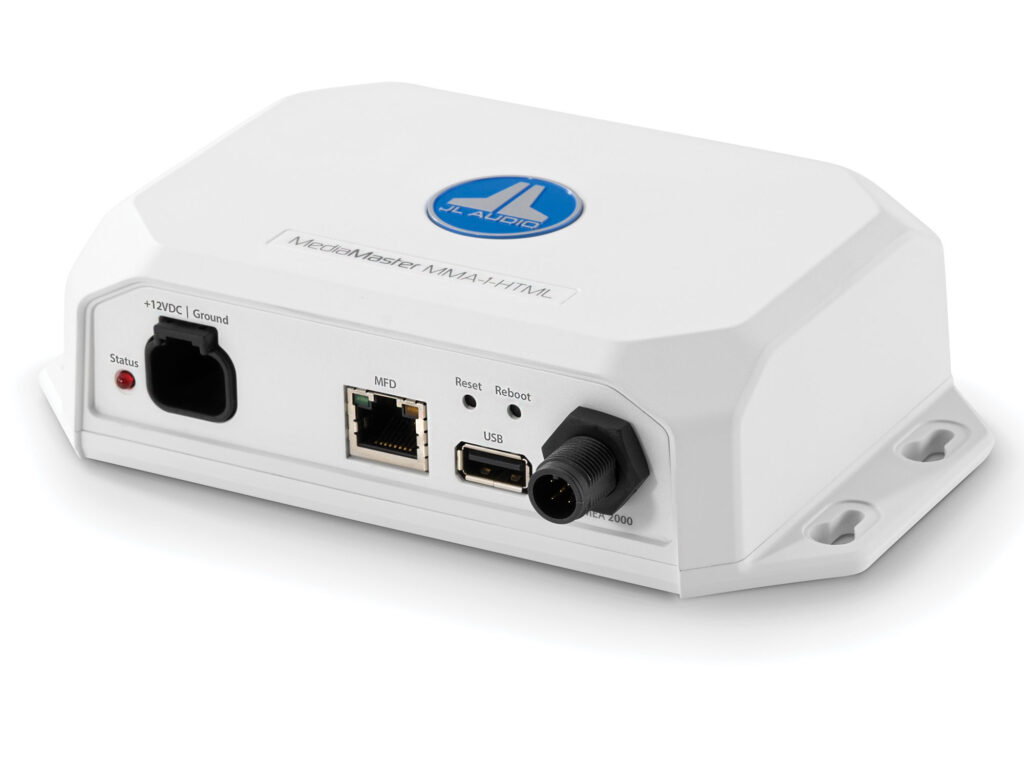
JL Audio HTML Interface
JL Audio’s new NMEA 2000-connected MediaMaster HTML interface for JL Marine MediaMaster marine source units gives boaters full control of their premium sound system from an MFD. It allows display and control of all features from Simrad, Lowrance or Garmin MFDs.
Historically, MFDs provided limited compatibility and control for sound systems, which made having an audio-system control head necessary. This HTML interface ends the need for a dedicated audio-system controller, moving control and management to the MFD. It also reduces clutter at the helm, freeing space for installing other equipment on the dash. $499.99; jlaudio.com
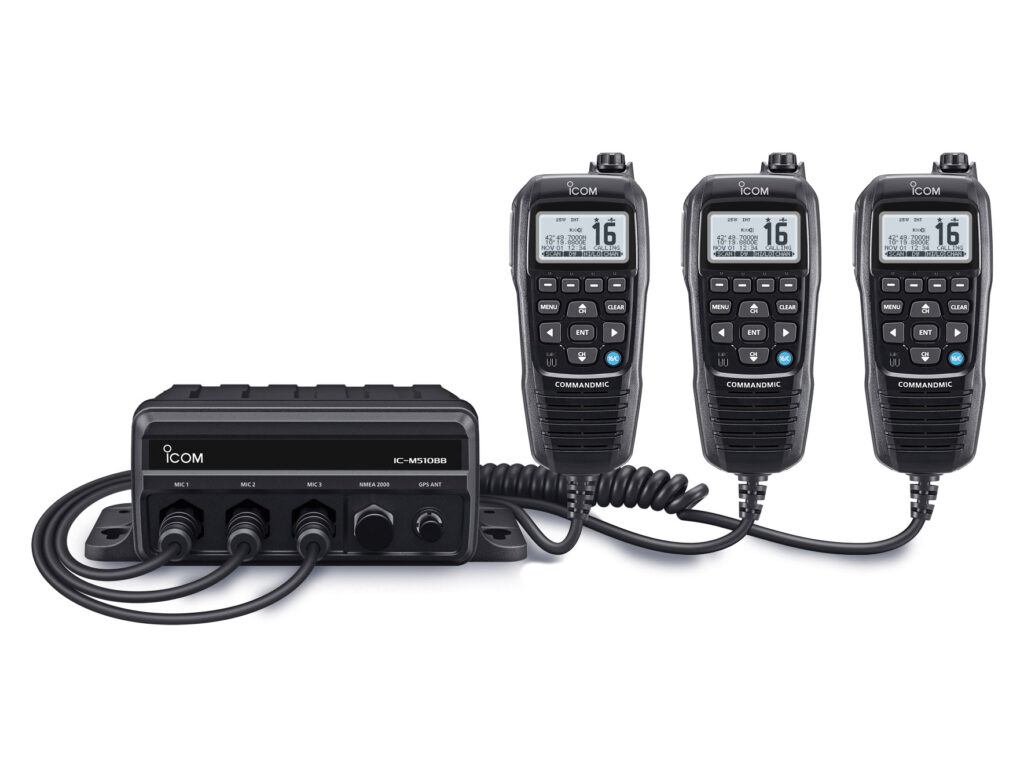
Icom IC-M510BB Black-Box VHF Radio
Icom’s new IC-M510BB represents the latest in VHF technology, letting you expand your VHF accessibility throughout the boat. All operations, including DSC, can be made from the CommandMic, allowing the VHF radio unit to be installed in an out-of-sight place and as far as 60 feet from the CommandMic.
Up to three CommandMics can be connected to the IC-M510BB, allowing it to double as an onboard intercom system on large boats. NMEA 2000 networking capabilities provide plug-and-play data communication with other electronics, such as an MFD. The radio can also share GNSS/GPS position data, AIS, and DSC calls with other onboard equipment. The unit has a last-call voice-recording function that automatically saves up to two minutes of a recent incoming call. A built-in 15-watt amplifier increases the audio output to an external hailer/speaker, and there’s a built-in hailer function that also sounds foghorn patterns. $799.95; icomamerica.com
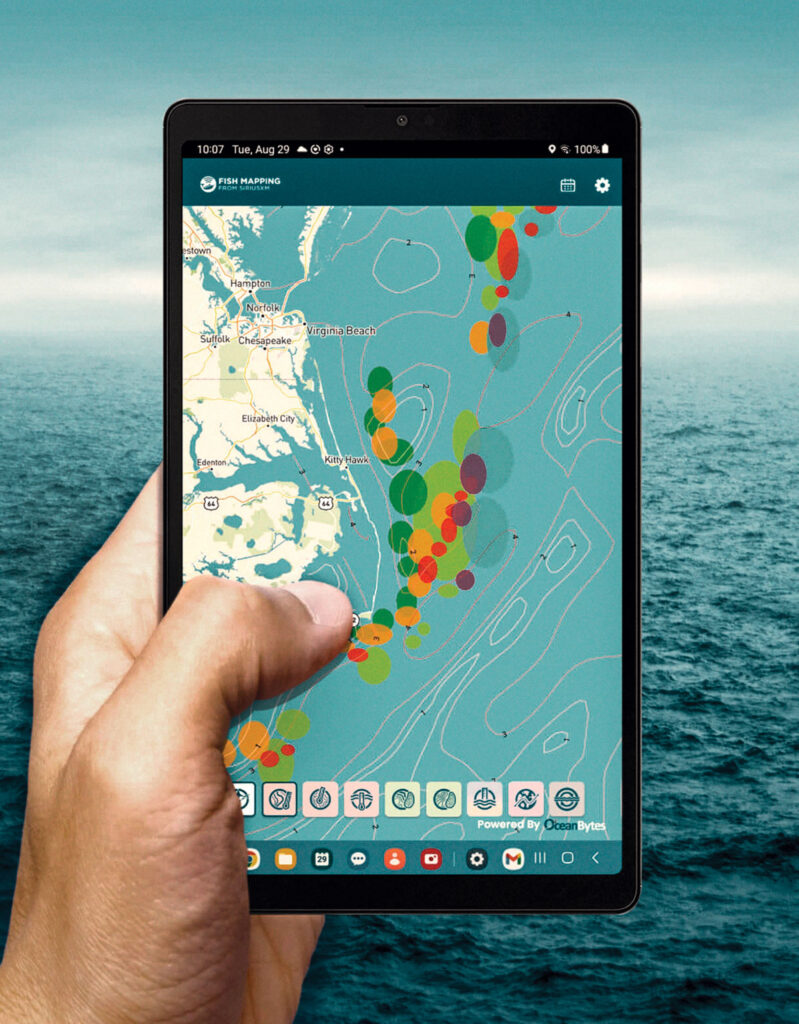
SiriusXM Fish Mapping App for Mobile Devices
SiriusXM Marine’s satellite-delivered Fish Mapping data service provides detailed fishing and weather information directly on a boat’s MFD to help find fish and stay safe. Now for no additional cost subscribers can also download and use a Fish Mapping app on shore to plan ahead.
It provides access to the same eight dedicated fishing features available on an MFD, plus two additional app-exclusive features:
- Historical data that lets you observe how currents, temperature contours, plankton fronts and other data have moved over the past few days
- Ocean-current movements using arrows to show direction, with the speed reflected in the size of the arrows (the larger, the faster the currents).
The data is overlaid directly on your chart so you can see information relative to the location of your boat. $109.99 per month; siriusxm.com
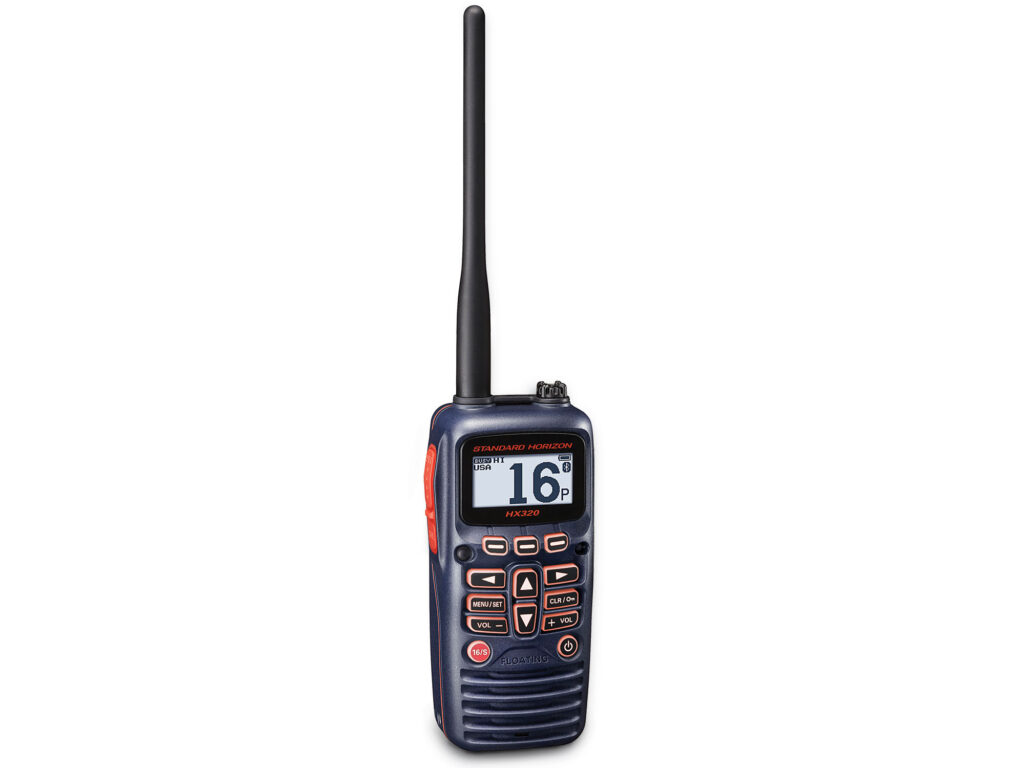
Standard Horizon HX320 Submersible Handheld VHF Radio
Standard Horizon’s new HX320 handheld VHF radio provides a full 6 watts of transmit power, and it also can be set to 2.5 or 1 watt of transmit power to assist in obtaining maximum battery life when talking at closer range. Its speaker is engineered with 700 mW of power for loud and clear audio reception, and the large channel display proves easy to read.
The HX320 also enables wireless operation using the optional Bluetooth Standard Horizon SSM-BT10 headset. A built-in rechargeable 2,100 mAh high-capacity lithium polymer battery provides up to 17 hours of operation on one charge. The HX320 also features an IPX7 water-submersion rating and floats, in case you drop it or, worst-case scenario, need to abandon ship. A water-activated emergency strobe light helps guide rescuers. $149.99; westmarine.com
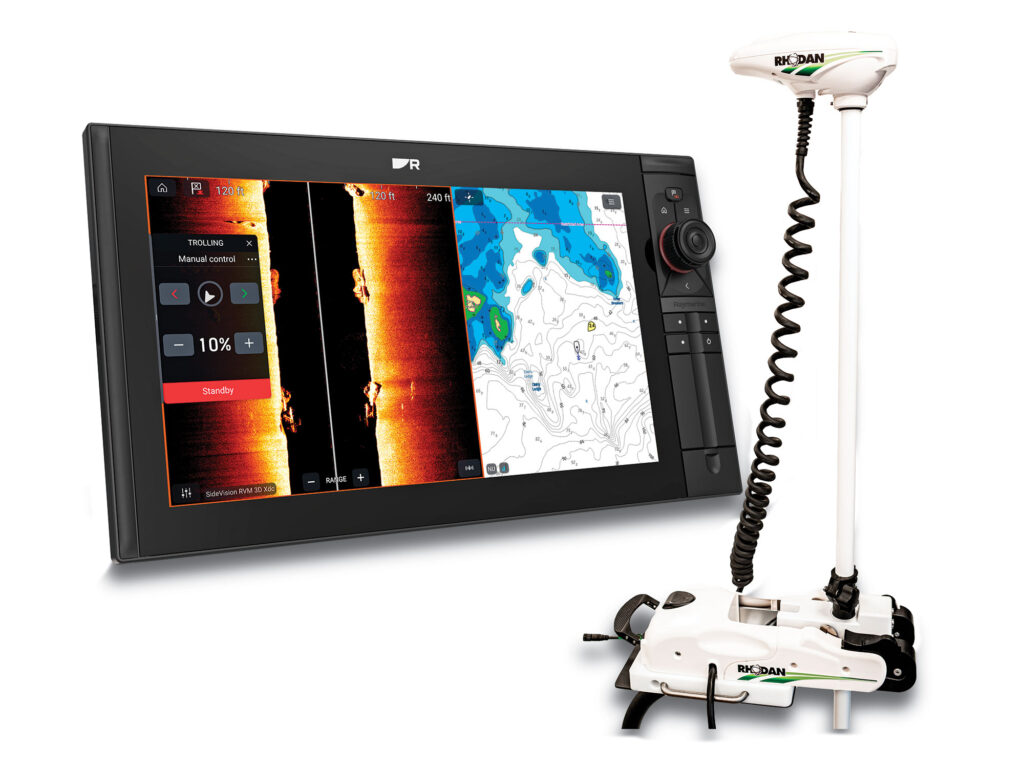
Raymarine-Rhodan Integration
Raymarine’s Axiom MFDs can now integrate with Rhodan Marine’s bow-mount saltwater trolling motors, which range from 12 to 36 volts in shaft lengths up to 108 inches. Anglers can control Rhodan trolling motors from an Axiom 2 Pro or XL MFD just as they would from the Rhodan key fob. The integration allows anglers to increase and decrease thrust, and adjust the motor’s direction, which is clearly shown on the Axiom display.
With the Hold Heading mode, boaters can maintain a heading and adjust it in 1-degree increments. The system can also maintain position over a fishing spot. Raymarine’s integration with Rhodan can automatically detect whether the trolling motor is stowed or deployed. This innovative feature enables Axiom to steer the trolling motor when it is active, but then control a Raymarine Evolution autopilot when the Rhodan motor is stowed.
Rhodan integration with Axiom requires upgrading to Raymarine’s LightHouse 4.5 operating system. To learn more about this system, visit raymarine.com or rhodanmarine.com.
Read Next: Seven Affordable Satcom Systems for Boating Anglers
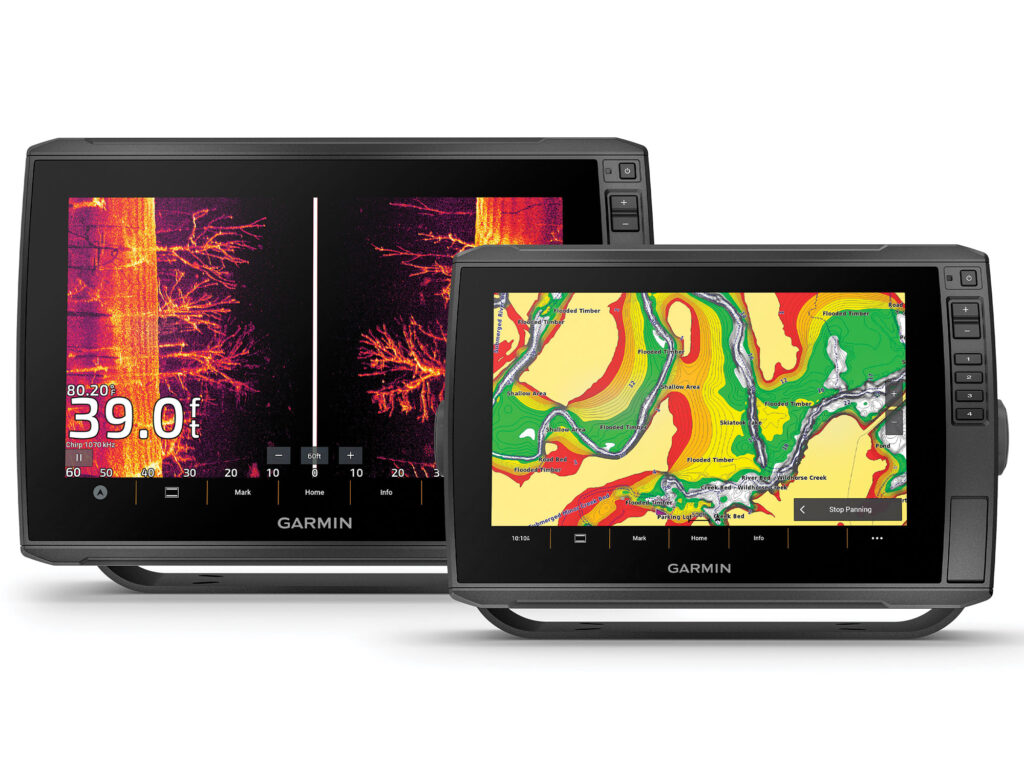
Garmin EchoMap Ultra 2 Series
Garmin’s EchoMap Ultra 2 chart-plotter series is designed to offer advanced features for nearshore anglers, including wireless networking, multi-band GPS and a new user interface. The plotters are available in 10-inch (106sv) or 12-inch (126sv) sunlight-readable touchscreens with keyed assist. The Ultra 2 series features the new Ultra High-Definition (UHD) scanning sonar and comes preloaded with Garmin Navionics+ mapping with a one-year subscription for daily updates. The wireless networking lets you share sonar, waypoints and routes with other EchoMap Ultra 2 or UHD2 chart plotters, eliminating the need for cable connections.
There’s also a screen-recording feature accessible via the ActiveCaptain app that can capture what’s on the chart-plotter screen to share via text or social media. The Ultra 2 chart plotters are available with a GT56UHD all-in-one transducer that provides Garmin chirp traditional sonar and UHD ClearVu and SideVu scanning images of what’s below and to the sides of the boat. The new series also supports the full lineup of Garmin’s award-winning LiveScope live-scanning sonar systems. The new models range from $1,899.99 to $3,099.99. To learn more, visit garmin.com/marine.

